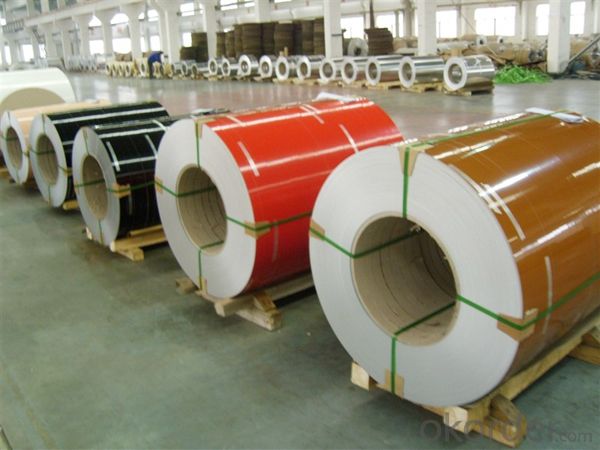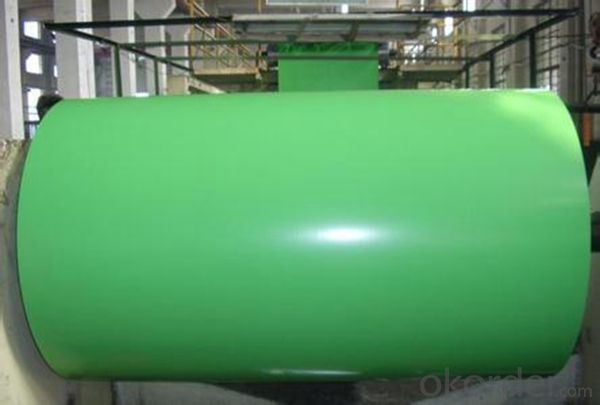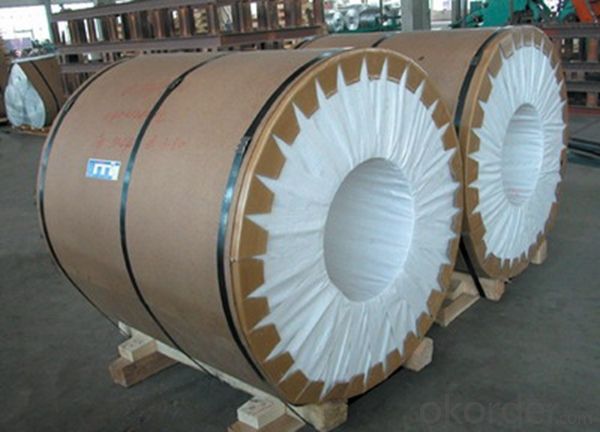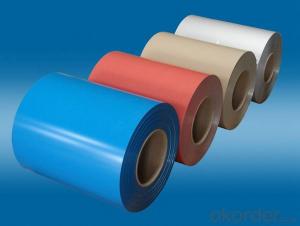Wooden Grain Coating Aluminium Coil PVDF Painting
- Loading Port:
- Shanghai
- Payment Terms:
- TT OR LC
- Min Order Qty:
- 5 m.t.
- Supply Capability:
- 10000 m.t./month
OKorder Service Pledge
OKorder Financial Service
You Might Also Like
Item specifice
1. Specification of Wooden Grain Coating Aluminium Coil PVDF Painting
Material | Alloy Aluminum 1XXX,3XXX,5XXX or customer nominated |
Temper | T3, T4, T5, T6 |
Surface | Anodize, electrophoresis, powder coating,PVDF coating, wood grain painting, matted, etc. |
Colour | Any colour based on Standard Germany RAL Mark |
Length | Coating 6.5 meters, Anodizing 6.5 meters, Mill finish 5 meters |
Press Machine | 500-4000 tons all together 64 press lines. |
Fabrication | 1. Windows and doors; 2. Drilling; 3. Bending; 4. Cutting; 5. etc. |
Certificate | ISO 9001 |
Moulding | 1. Using our moulds, no fee; |
2. Using customer drawing, opening mould, usually about 10~50 tons then the moulding can be refunded. | |
3. Mould cost is negotiable base on the order quantity | |
Capability | Annual output 100,000 tons |
2. Application of Wooden Grain Coating Aluminium Coil PVDF Painting
(1).Interior: wall cladding, ceilings, bathrooms, kitchens and balconies, shutters, doors...
(2).Exterior: wall cladding, facades, roofing, canopies, tunnels,column covers , renovations...
(3).Advertisement: display platforms, signboards, fascia, shop fronts...
3. Feature of Wooden Grain Coating Aluminium Coil PVDF Painting
Be free from Oil Stain, Dent, Inclusion, Scratches, Stain, Oxide Dicoloration, Breaks, Corrosion, Roll Marks, Dirt Streaks and other defect which will interfere with use
4. Certificate:
SGS and ROHS(if client request, paid by client), MTC(plant provided), Certificate of Origin(FORM A, FORM E, CO), Bureau Veritas and SGS (if client request, paid by client), CIQS certificate
5. Image of Wooden Grain Coating Aluminium Coil PVDF Painting



6. Package and shipping of Wooden Grain Coating Aluminium Coil PVDF Painting
eye to wall
eye to the wall
with wood pallet (wooded case also available)
7. FAQ
1) What is the delivery time?
Dpends on actual order, around 20 to 35 days
2)What is the QC system:
We have QC staff of 20 persons and advanced equipment, each production is with MTC traced from Aluminum ingot lot.
3) What market do you mainly sell to?
Australia, America, Asia, Middle East, Western Europe, Africa etc
- Q:Can aluminum coils be insulated?
- Indeed, insulation can be applied to aluminum coils. It is a widespread practice to enhance energy efficiency and avoid heat loss or gain. Usually, the insulation material envelops the aluminum coil, creating a safeguarding coating that minimizes thermal transfer. This insulation method contributes to preserving the desired temperature within the coil and averting detrimental condensation. Moreover, insulation additionally enhances the overall functionality and durability of the aluminum coil system.
- Q:How much can i get for a gallon filled with aluminum Tabs from cans
- Aluminum is not sold by the gallon, it is sold by the pound, so you need to weigh what you have to determine what it is worth. Aluminum is not expensive, so the price you can expect is around 30 to 60 cents per pound.. Contact local recycling centers near you to find out what the going rate for is in your area.
- Q:Can aluminum coils be used in automotive manufacturing?
- Yes, aluminum coils can be used in automotive manufacturing. Aluminum is a lightweight and durable material, making it a suitable choice for various automotive components such as body panels, engine parts, and heat exchangers. Its corrosion resistance and recyclability also make it an attractive option for the automotive industry.
- Q:What is the typical lead time for manufacturing aluminum coils?
- The typical lead time for manufacturing aluminum coils can vary depending on various factors such as the complexity of the order, the quantity required, and the current demand in the market. However, on average, it can range from a few weeks to a couple of months.
- Q:Are aluminum coils suitable for food packaging?
- Food packaging can indeed utilize aluminum coils. Aluminum is extensively employed in the food packaging sector because of its various advantageous characteristics. To start off, aluminum serves as a non-toxic and non-reactive substance, ensuring that harmful substances do not leach into the food. Moreover, it acts as an impermeable barrier to gases and moisture, effectively safeguarding the food from oxygen, light, and moisture that could spoil its quality or alter its taste. In addition, aluminum coils are lightweight, facilitating their transportation and handling. They are also highly malleable, enabling them to be easily shaped and formed into various packaging designs. Additionally, aluminum's heat conductivity properties are commendable, allowing for efficient heat transfer during food processing or cooking. Finally, aluminum demonstrates its commitment to the environment as a sustainable and recyclable material, making it an eco-friendly choice for food packaging. Overall, due to its safety, barrier properties, lightweight nature, flexibility, heat conduction capabilities, and sustainability, aluminum coils are a suitable and widely embraced option for food packaging.
- Q:Can aluminum coils be formed into different shapes?
- Yes, aluminum coils can be formed into different shapes. Aluminum is a highly malleable metal, which means it can easily be bent, shaped, and formed without breaking. This property makes it an ideal material for various applications where flexibility and versatility are required. Aluminum coils can be formed into different shapes using a variety of techniques, such as bending, rolling, stamping, extrusion, or even by using specialized machinery like a coil forming machine. These processes allow the aluminum coils to be transformed into a wide range of shapes, including sheets, plates, tubes, wires, or complex three-dimensional forms. The ability to form aluminum coils into different shapes makes it an excellent choice for industries such as construction, automotive, aerospace, and manufacturing, where customized parts and components are often needed.
- Q:What are the different types of surface treatments for corrosion resistance?
- Various materials can benefit from different surface treatments to enhance their resistance to corrosion. These treatments can be grouped into mechanical, chemical, and electrochemical methods. 1. To improve corrosion resistance, mechanical surface treatments involve physically altering or modifying the material's surface. Shot peening, sandblasting, and polishing are common methods. Shot peening induces compressive stresses by bombarding the material with small metal pellets, preventing corrosion. Sandblasting removes existing corrosion and creates a clean, smooth surface by blasting it with abrasive particles. Polishing, using abrasives, creates a smooth, reflective surface that reduces the chances of corrosion initiation. 2. Chemical surface treatments involve applying a chemical solution or coating to create a protective layer against corrosion. Chromating, for example, applies a chromate conversion coating that acts as a barrier against corrosion and improves adhesion for subsequent paint or coating layers. Anodizing, commonly used for aluminum surfaces, creates a thick oxide layer that enhances corrosion resistance and can provide decorative finishes. Other chemical treatments, like phosphating, passivation, and galvanizing, use specific chemical solutions or coatings to protect against corrosion. 3. Electrochemical surface treatments utilize electrochemistry principles to create a protective layer. Electroplating involves depositing a thin layer of a more corrosion-resistant material, such as zinc, nickel, or chromium, onto the base material's surface. Anodic protection connects a sacrificial anode to the material, causing the anode to corrode instead of the material itself. This method is commonly used for underground structures and pipelines. The choice of surface treatment for corrosion resistance depends on factors like the material, intended application, and desired level of protection. It is crucial to consider factors like cost, environmental impact, and performance requirements when selecting the appropriate treatment, as each method has its advantages and limitations.
- Q:Are aluminum coils suitable for architectural roofing systems?
- Architectural roofing systems can indeed make use of aluminum coils. The popularity of aluminum as a roofing material stems from its many advantages. To begin with, aluminum is lightweight, making it easy to handle during installation and decreasing the burden on the building's structure. Furthermore, aluminum is highly durable and resistant to corrosion, ensuring that it will last for a long time as a roofing option. Its exceptional thermal properties are worth noting as well, as it can reflect heat and lead to reduced energy consumption. Another advantage is the ease with which aluminum coils can be molded and shaped into various profiles and designs, allowing for flexibility in architectural styles. Lastly, aluminum is an environmentally friendly choice for roofing systems, as it is both recyclable and sustainable. In conclusion, aluminum coils are a practical and suitable choice for architectural roofing systems, offering durability, versatility, and energy efficiency.
- Q:Can aluminum coils be used in the production of automotive body panels?
- Yes, aluminum coils can be used in the production of automotive body panels. Aluminum is a lightweight and highly malleable material, making it an ideal choice for automotive applications. It offers a good balance between strength and weight, which can help improve fuel efficiency and overall vehicle performance. Additionally, aluminum has excellent corrosion resistance properties, which is crucial for automotive body panels exposed to harsh environmental conditions. The use of aluminum coils in the production of automotive body panels has become increasingly popular as automakers strive to reduce the weight of vehicles and improve their sustainability.
- Q:What are the advantages of using aluminum coils?
- There are several advantages to using aluminum coils. Firstly, aluminum is a lightweight material, which makes the coils easier to handle and transport. Secondly, aluminum is highly resistant to corrosion, making it a durable choice for various applications, especially in humid or corrosive environments. Additionally, aluminum has excellent thermal conductivity, allowing for efficient heat transfer in applications such as HVAC systems or refrigeration. Lastly, aluminum coils are recyclable, making them a more sustainable option compared to other materials.
1. Manufacturer Overview |
|
|---|---|
| Location | |
| Year Established | |
| Annual Output Value | |
| Main Markets | |
| Company Certifications | |
2. Manufacturer Certificates |
|
|---|---|
| a) Certification Name | |
| Range | |
| Reference | |
| Validity Period | |
3. Manufacturer Capability |
|
|---|---|
| a)Trade Capacity | |
| Nearest Port | |
| Export Percentage | |
| No.of Employees in Trade Department | |
| Language Spoken: | |
| b)Factory Information | |
| Factory Size: | |
| No. of Production Lines | |
| Contract Manufacturing | |
| Product Price Range | |
Send your message to us
Wooden Grain Coating Aluminium Coil PVDF Painting
- Loading Port:
- Shanghai
- Payment Terms:
- TT OR LC
- Min Order Qty:
- 5 m.t.
- Supply Capability:
- 10000 m.t./month
OKorder Service Pledge
OKorder Financial Service
Similar products
New products
Hot products
Related keywords





























